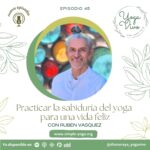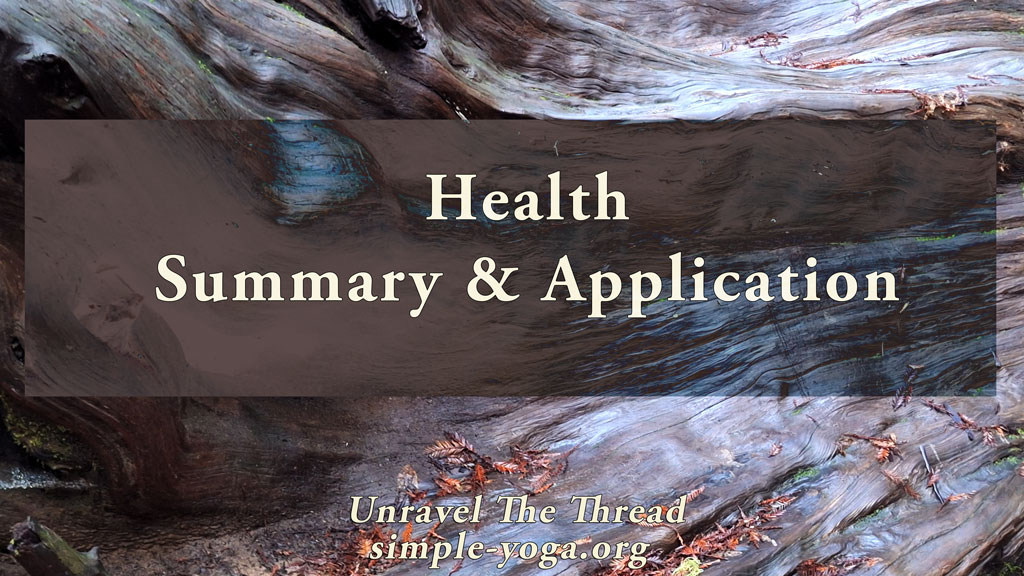
Video Aligning your Spine
November 30, 2024
Interview on applying the wisdom of yoga (in Spanish)
January 28, 2025
Video Aligning your Spine
November 30, 2024
Interview on applying the wisdom of yoga (in Spanish)
January 28, 2025Health, Summary and application (part 6)

Health Summary and application (part 6)
This is the final episode in the series on our integral definition of health. Once again, our definition: Health is the harmonious integration of adequate appetites, efficient elimination, optimal posture, graceful movement, calm mind, cheerful attitude, and compassionate interaction.
Notice how this comprehensive definition is an example of applying the idea of range of action to our thinking to cultivate a broader and deeper perspective. This definition also serves as a reminder that our physical, mental, emotional, and social aspects are deeply interconnected. For example, your emotional state and attitude influence your appetite, and the state of your elimination is likely to influence the ease of your posture and the quality of your movements. As we reflect on our definition, it is important to recognize that health is dynamic, especially when we realize that health is an ongoing process of self-discovery and self-care that is achieved by embodying our awareness through intelligent, kind, and compassionate actions.
As usual, the following questions invite you to bring this definition into your everyday life.
Thinking about adequate appetites
Pay attention to cravings. Do you notice any patterns and inclinations?
Distinguish between wants and needs. (Yama of satya 2.30)
What stimulates your appetites?
To what extent do physical activities influence your appetite?
What happens when you practice moderation? (Yama of aparigraha 2.30)
How are your appetites influenced by attending to subtle sense perceptions (1.35 https://simple-yoga.org/1-35-focus-on-subtle-sense-perceptions/)
What mental activities influence your appetites? How?
What effect do your emotions play in your appetites?
Does the media you consume affect your appetites?
Once you have stimulated your appetite do you consciously and deliberately enjoy what you have an appetite for? Or does your attention jump to a different enticing object?
How do you satisfy your appetites? How do you feel as a result?
Thinking about efficient elimination
Is there a balance between your appetites and your elimination?
Is there a difference between efficient elimination and releasing of an urge?
In your experience what contributes to efficient elimination?
Is elimination associated with a feeling of ease and relief?
Regarding physical elimination
What is the optimum dietary fiber intake for you?
What level of hydration seems to be most helpful for efficient elimination?
What foods contribute to regularity?
Does moderate activity, like a post-prandial walk, contribute to enhance digestion and elimination for you?
What objects are unnecessary?
About mental elimination
What methods help you let go of recurring thoughts?
What are some effective ways to quiet your mind? Can you try the suggestions in sutras 1.32 to 1.39?
What are some ways of resolving thoughts so that you do not have to revisit the same line of thinking?
About emotional elimination
Do you have useful strategies to make peace with past events so that you can effectively let go of regrets?
What techniques do you use in order to let go of future events so that you can let go of anxiety?
What uplifting emotions can create peace in your body, mind and heart? Consider Yoga Sutra 1.39, Pratipaksha bhavana in 2.33 and 2.34 as well as 1.33.
Regarding posture and movement
Recognize the individual nature of optimal posture, what is ideal in posture and movement varies for each person and is different even for the same person at different times.
Are you aware of the most frequent positions you adopt during your day? Are those positions contributing to optimal posture and graceful movement?
In your physical activities, how do you monitor your posture and movements to ensure effective, efficient and enjoyable action?
In your physical practice do you emphasize strength, flexibility, speed, endurance or mindfulness? What is most important to you?
Are your movements deliberate or are they mechanical?
Can you differentiate moving with control from using momentum? What differences do you feel?
How do you regulate the intensity of effort in your activities?
Can your posture and movement embody steadiness, ease and economy of effort?
How do you integrate muscular actions, nervous system instructions, and sensory feedback?
To what extent are you able to explore the range of possibilities in your postures and movements?
Are you aware of your habitual attitudes, thoughts, and emotions and their physical manifestations? Perhaps by focusing on feeling, or choosing to be happy, or letting go of complaining.
About Compassionate interaction
How broad or narrow is your definition of interaction?
Do your interactions contribute to disappointments, frustrations, successes, and accomplishments?
What happens when you cultivate friendliness, compassion, inspiration, and equanimity?
Observe the ripple effect of kindness: Do acts of kindness inspire others to act in a similar way?
How do you interact with yourself?
Are your interactions influenced by inner states of worry, upset, illness, health, strength, and good mood?
Is it possible to make your interactions effortless?
How do my interactions influence my health?
Calm mind and cheerful attitude
What happens when you develop the habit of observing your state of mind? What tendencies do you notice most often, is your mind sleepy, aware, restless or focused?
Is it helpful to explore the differences between awareness and its contents?
To what extent can you modulate the state of your mind?
Can your awareness turn inward and be free from disturbances by chanting OM?
Is it helpful to recognize the five states of mind according to Vyasa (Identify whether your mind is wondering, dull, distracted, concentrated, or restrained)?
Can you cultivate a calm mind by focusing on what is important, maintaining perspective, and considering opposing viewpoints with minimal bias?
What happens if you follow Patanjali’s suggestions for calming your mind?
Single pointed focus
Friendliness, Compassion, Inspiration, Equanimity
Exhalations and retentions
Focus on subtle sense perceptions
Cultivating inner light
Focus on serenity beyond desire
Insight from dreams
Focus on anything uplifting
Is it possible to embrace the full range of emotions while maintaining a generally cheerful attitude?
Can your regular yoga practice help you develop resilience to bounce back from challenging experiences?
Is there a relationship between a calm mind and cheerful attitude? How can one influence the other and vice versa?
Cumulative effect of cultivating our health
Some people suggest that each time we do something that supports and enhances our health, we are investing in our resilience; in other words, each time we take care of our health by making sure we get enough sleep, eat a healthy diet, get enough exercise, meditate, practice gratitude, practice mindfulness, favor uplifting thoughts, cultivate meaningful relationships, we are making deposits in a “health savings account.” The deposits accumulate over time, perhaps even earning interest, which strengthens our immune system and overall resilience, allowing us to recover from injury and illness more quickly and easily than if we didn’t. Does that make sense to you?
Although this broad definition may seem overwhelming because there are so many things we need to do to be healthy, consider that you can improve your health by making small, practical, sustainable changes that help you feel better. It doesn’t have to happen all at once. See if taking one small step at a time can help you feel a change for the better. Each small action helps create a new habit that becomes stronger with consistency. Also, making smart choices is likely to work on multiple levels. For example, eating something that is good for you will help you feel better, it will probably help with your elimination, and it will contribute to your peace of mind knowing that you are being kind to yourself.
We have mentioned before that wisdom is pure common sense. Perhaps all of the yogic techniques are ways of cultivating physical, physiological, mental, emotional and interpersonal wisdom, resulting in feelings of great vitality and inner connectedness that lead us to greater inter-connectedness. What do you think?
As always, I am not asking you to believe these ideas, but to consider them and explore whether you can test them through your daily practices and living. I am curious to know what you find.
If you prefer, you may listen to the podcast:
This is an excerpt from the book Unravel the thread: Applying the ancient wisdom of yoga to live a happy life
If you find Simple-Yoga.org and Unravel the thread useful, consider supporting my labor with a donation, you may also donate using PayPal or Venmo. Thank you!
